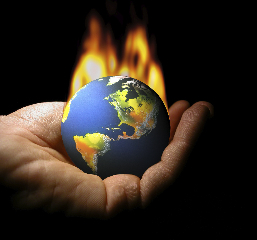When I think about climate change, what typically comes to mind is the weather: hot days, droughts, and other severe weather events – but all too often there are other effects of climate change that are greatly underestimated. In fact, some consequences of climate change may not have anything to do with the weather at all. The overcrowding in the Dadaab refugee camp in Kenya, for example, is a result of the East African drought, which is a consequence of climate change. It’s just the beginning of a long chain of events, and when examining the potential domino effect from climate change, it can be pretty terrifying. The latest claim? According to Secretary-General Ban Ki-moon of the United Nations, climate change is a threat to international peace and security.
At first glance, climate change and international peace and security may seem unrelated. However, they really aren’t – climate change can lead to environmental problems and consequently a lack of resources, like food and water. Changing and unpredictable rainfall patterns, for example, can cause food shortages and production instability. When people start to fight over the limited resources, it can undoubtedly become an international security conflict. With climate change comes instability, and with instability comes stress and tension. At a global level, this tension can become extremely dangerous and destructive. And before we know it, we could have a global conflict at our hands, and it all started with increasing temperatures.
The most terrifying part? Climate change is a global threat itself, and it isn’t a typical threat to international security. It can’t be combated with training and army and winning a war, nor can the effects be reversed with nonviolent negotiation and a peace treaty. It will take a force that hasn’t yet been created – or even conceptualized – to fight this on a global level. It will take pure strategy, innovation, willingness to change, and commitment. No threat to global security has ever been so great – there is truly no alternative to reversing climate change, because if we continue on this path, it will be catastrophic.
winning a war, nor can the effects be reversed with nonviolent negotiation and a peace treaty. It will take a force that hasn’t yet been created – or even conceptualized – to fight this on a global level. It will take pure strategy, innovation, willingness to change, and commitment. No threat to global security has ever been so great – there is truly no alternative to reversing climate change, because if we continue on this path, it will be catastrophic.
I write a lot about the need to combat, slow, and ultimately reverse climate change. Sometimes I feel like I’m beating a dead horse, but then I remember just how important this is. Actually, it’s essential – and I’m glad that the United Nations have made fighting climate change a priority. The establishment of the United Nations Framework Convention on Climate Change (UNFCCC) and the Intergovernmental Panel on Climate Change (IPCC) have been a step forward in creating plans and policies to combat climate change. However, I sometimes wonder if this is enough. Can the United Nations handle a global crisis of this magnitude? Is organizing conferences enough? Is climate change being fought on a multidimensional level so that each effect down the chain of events can be stopped?
Perhaps more needs to be done. There are so many nonprofit organizations that are working toward climate change, for example. There are also government initiatives and social movements that aim to reduce carbon emissions. Basically, climate change is being attacked in many different ways, without an overarching strategy to make them all work together. What if there was a central organization created that used the strategy of the individual organizations to form a global strategy that attacked the various – and numerous – effects of climate change, no matter how immediately related they are? This goes back to the nonprofit disconnect and the need to link smaller organizations to create a much bigger change. After all, when it comes to climate change, there certainly needs to be a big change.
I think there needs to be an organization created that’s separate from the U.N. and focuses solely on climate change and its effects. While the United Nations Environmental Program (UNEP) does exist, it’s not big enough to take into account all of the effects of climate change. The U.N. itself handles many of them, like global peacekeeping and protecting refugees, so the individual program strategies should certainly be a part of the overall strategy of the climate change organization, but there needs to be an innovative, organized, and focused coalition to make this all work. I really think a new, global approach is our best shot to fighting this war.
Rebecca Birnbaum is a Program and Research Intern with the SISGI Group focusing on nonviolent conflict resolution, nonprofit management, and sustainable development. She is a senior at the University of Michigan, where she studies Anthropology, Political Science, and Peace and Social Justice. To learn more about the SISGI Group, visit www.sisgigroup.org.


